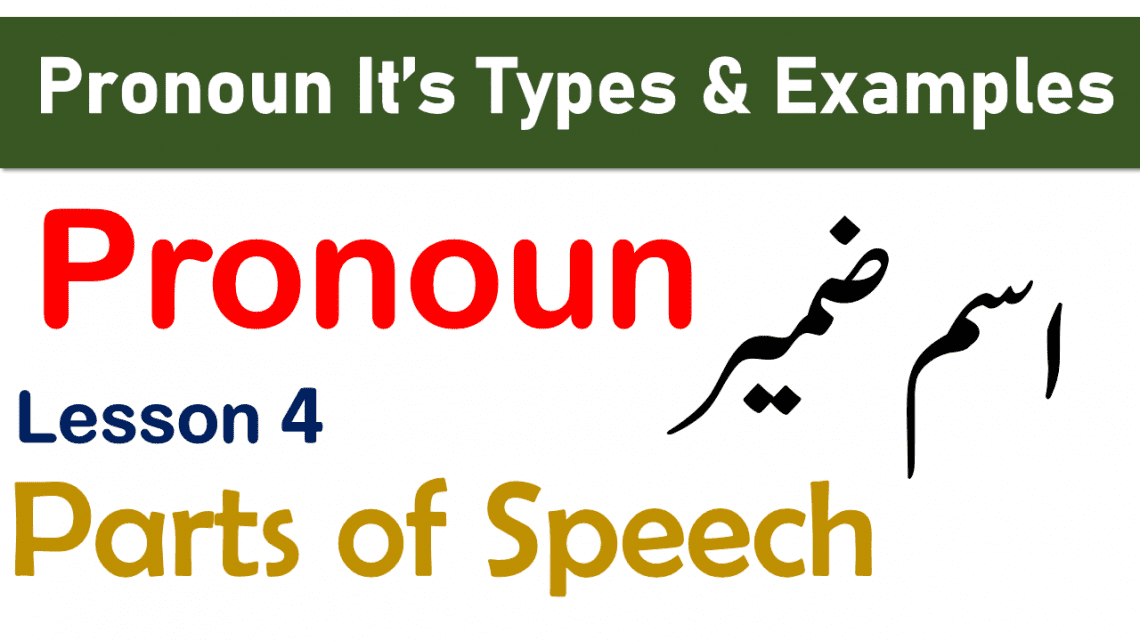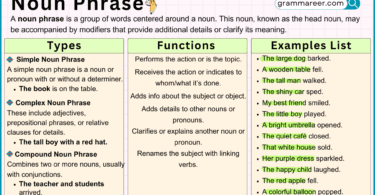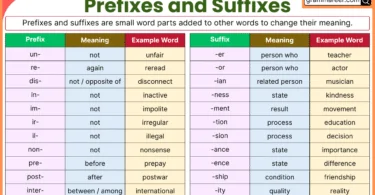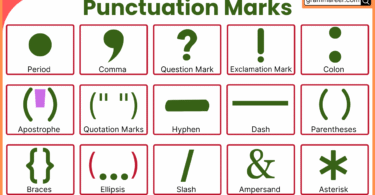Pronouns are simple words that replace nouns to avoid repetition and make sentences clearer. In this blog post, you’ll learn all types of pronouns in English with their Urdu meanings and sentence examples. This guide is ideal for beginners who want to improve their grammar, sentence formation, and writing skills. To learn more, visit our grammar category.
Table of Contents
What is a Pronoun?
A pronoun is a word used in place of a noun to avoid repetition and make sentences clearer. For example, instead of saying “Sarah said Sarah is coming,” you can say “Sarah said she is coming,” where “she” is the pronoun replacing “Sarah.”
تعریف: وہ لفظ جو کسی اسم کی اسم کی جگہ بولا جاۓ اسے اسم ضمیر کہتے ہیں۔
| English Sentence | Urdu Translation |
|---|---|
| Sahar is a girl. | سحر ایک لڑکی ہے۔ |
| She is hardworking. | وہ محنتی ہے۔ |
| Ahmad is a boy. | احمد ایک لڑکا ہے۔ |
| He is good. | وہ اچھا ہے۔ |
ان مثالوں ميں ناموں کی جگہ استعمال ہونے والے الفاظ کو اسم ضمیر کہتے ہیں۔
Types of Pronouns
Types of Pronouns are categories that show how pronouns are used in a sentence. Each type serves a specific grammatical function by replacing a noun or referring to something/someone. Here’s a clear breakdown:
1. Personal Pronouns
There are three types of personal pronouns.
ضمائر شخصی کی تین اقسام ہیں۔
- First Person:
The first person is the person speaking.
بات کرنے والے کو شخص متکلم کہتے ہیں۔ متکلم یا واحد ہوتا ہے یا جمع۔
I, me, my is used for singular and We, our, us is used for plurals.
Examples:
| English Sentence | Urdu Translation |
|---|---|
| I read my lesson daily. | میں اپنا سبق روزانہ پڑھتا ہوں۔ |
| He helps me. | وہ میری مدد کرتا ہے۔ |
| We read our lesson daily. | ہم اپنا سبق روزانہ پڑھتے ہیں۔ |
| They helped us. | انہوں نے ہماری مدد کی۔ |
- Second Person:
The second person is the person spoken to.
جس شخص سے بات کی جاۓ اسے حاضر یا مخاطب کہتے ہیں۔ مخاطب (حاضر) واحد بھی ہوتا ہے اور جمع بھی۔
Examples:
| English Sentence | Urdu Translation |
|---|---|
| You are a boy. | تم ایک لڑکا ہو۔ |
| You are teachers. | تم اساتذہ ہو۔ |
| This is your book. | یہ تیری کتاب ہے۔ |
| These are your books. | یہ آپ کی کتابیں ہیں۔ |
iii. Third Person:
The third person is the person whom we speak about.
جس کے متعلق کوئی بات کی جاۓاسے غائب کہتے ہیں۔
Examples:
| English Sentence | Urdu Translation |
|---|---|
| He is a man. | وہ ایک آدمی ہے۔ |
| She is a girl. | وہ ایک لڑکی ہے۔ |
| It is a pen. | یہ ایک قلم ہے۔ |
| They are boys. | وہ لڑکے ہیں۔ |
| This is his book. | یہ اس کی کتاب ہے۔ |
| This is her bag. | یہ اس کا بستہ ہے۔ |
| Its price is ten rupees. | اس کی قیمت دس روپے ہے۔ |
| They are their brothers. | وہ ان کے بھائی ہیں۔ |
Chart of Personal Pronouns
| Person | Nominative Case | Possessive Case | Objective Case | |
| 1st | واحد | I -میں | My – میرا | Me -مجھے |
| جمع | We -ہم | Our – ہمارا | Us – ہمیں | |
| 2nd | واحد | You – تم،آپ | Your – تمہارا | You – تمہیں |
| جمع | You – تم | Your – تمہارا | You – تمہیں | |
| 3rd | واحد(مذکر) | He – وہ | His – اس کا | Him – اسے |
| واحد(مونث) | She – وہ | Her – اس کا | Her – اسے | |
| بے جان | It – وہ | Its – اس کا | It – اسے | |
| جمع | They – وہ | Their – ان کا | Them – انہیں | |
2. Reflexive Pronouns
Definition: They are called reflexive pronouns when the action done by the subject turns back upon the subject.
تعریف: جب فاعل اپنے آپ پر ہی کام کریں تو انہیں ضمائر راجع الی الفاعی کہتے ہیں۔
Examples:
| English Sentence | Urdu Translation |
|---|---|
| We often deceive ourselves. | ہم اکثر اپنے آپ کو دھوکہ دیتے ہیں۔ |
| I saw myself in the mirror. | میں نے اپنے آپ کو آئینے میں دیکھا۔ |
| I hurt myself. | میں نے اپنے آپ کو زخمی کرلیا۔ |
| You hurt yourself. | تم نے اپنے آپ کو زخمی کرلیا۔ |
| We taught ourselves to swim. | ہم نے اپنے آپ کو تیرنا سکھایا۔ |
3. Emphatic pronouns
Definition: They are called emphatic pronouns when they are used for the sake of emphasis.
تعریف: جب ضمائر تاکیدی طور پر استعمال ہوں تو انہیں ضمائر تاکیدی کہا جاتا ہے۔
Examples:
| English Sentence | Urdu Translation |
|---|---|
| He himself said so. | اس نے خود یہ کہا۔ |
| She herself says so. | وہ خود یہ کہتی ہے۔ |
| I myself saw him do it. | میں نے خود اسے یہ کرتے ہوۓ دیکھا۔ |
| We saw the king ourselves. | ہم نے بادشاہ ہی کو دیکھا۔ |
| You will do it yourself. | تم یہ خود ہی کرو گے۔ |
Demonstrative Pronouns
Definition: Pronoun that “point out” are called demonstrative pronouns.
تعریف: ایسے ضمیر جو کسی چیز کی طرف اشارہ کریں ضمائر اشارہ کہلاتے ہیں۔
Examples:
| English Sentence | Urdu Translation |
|---|---|
| This is a book. | یہ ایک کتاب ہے۔ |
| These are my books. | یہ میری کتابیں ہیں۔ |
| That is a pen. | وہ ایک قلم ہے۔ |
| Those are pens. | وہ قلم ہیں۔ |
| Such were his actual words. | اس طرح اس کے اصل الفاظ تھے۔ |
4. Indefinite Pronouns
Definition: They are called indefinite pronouns when they refer to persons or things in a general way. But do not refer to any person or thing in particular.
تعریف: ایسے ضمائر جو غیر معین اشیاء یا اشخاص کے لیۓ استعمال ہوں ضمائر تنکیریہ کہلاتے ہیں۔
Examples:
| English Sentence | Urdu Translation |
|---|---|
| All were drowned. | سب کے سب ڈوب گۓ۔ |
| Do good to others. | دوسرے کے ساتھ نیکی کرو۔ |
| Some say he is mad. | کچھ کہتے ہیں وہ پاگل ہے۔ |
| Few escaped unhurt. | چند ایک صحیح سلامت بچ گۓ۔ |
| Many of them were Pakistani. | ان میں سے بہت سے پاکستانی تھے۔ |
5. Distributive Pronouns
Definition: They are called distributive pronouns when they refer to persons or things one at a time.
تعریف: ایسے ضمائر جو زیادہ اشخاص یا اشیاء کو ظاہر کریں لیکن ایک وقت میں واحد کے معنی دیں ضمائر تقسیمی کہلاتے ہیں۔
Examples:
| English Sentence | Urdu Translation |
|---|---|
| Each of the boys has a book. | ہر ایک لڑکے کے پاس کتاب ہے۔ |
| Either of you can go. | تم میں سے کوئی ایک جا سکتا ہے۔ |
| Neither of them is here. | ان میں سے کوئی بھی یہاں نہیں ہے۔ |
| Each took it in turn. | ہر ایک نے یہ (اپنی) باری پر لیا۔ |
| Either of these books is O.K. | ان کتابوں میں سے کوئی ایک ٹھیک ہے۔ |
6. Possessive Pronouns
Definition: Pronouns that show possession are possessive pronouns.
تعریف: ایسے ضمائر جو ملکیت کو ظاہر کریں ضمائر ملکیتی کہلاتے ہیں۔
Examples:
| English Sentence | Urdu Translation |
|---|---|
| This book is mine. | یہ کتاب میری ہے۔ |
| That pen is yours. | وہ قلم تمہارا ہے۔ |
| This shirt is his. | یہ قمیض اس کی ہے۔ |
| That pencil is hers. | وہ پنسل اس کی ہے۔ |
| These things are ours. | یہ چیزیں ہماری ہیں۔ |
7. Interrogative Pronoun
Definition: Pronouns that are used to ask question are interrogative pronouns.
تعریف: ایسے ضمائر جو سوالات پوچھنے کے لیۓ استعمال ہوں۔ ضمائر استفہامیہ کہلاتے ہیں۔
Examples:
| English Sentence | Urdu Translation |
|---|---|
| Who broke the window? | یہ کھڑکی کس نے توڑی ہے؟ |
| What shall we do now? | اب ہم کیا کریں گے؟ |
| Which would you prefer? | آپ کس کو ترجیح دیں گے؟ |
| Whose is this book? | یہ کتاب کس کی ہے؟ |
| What is that? | وہ کیا ہے؟ |
8. Relative Pronouns
Definition: They are called relative pronouns when they relate or refer to a noun which has gone before.
تعریف: ایسے ضمائر جن کا تعلق ایسے اسم سے ہو جن کا ذکر پہلے ہو چکا ہو ضمائر نسبتی کہلاتے ہیں۔
Examples:
| English Sentence | Urdu Translation |
|---|---|
| I know the boy who is coming. | میں اس لڑکے کو جانتا ہوں جو آ رہا ہے۔ |
| This is the house that Ali built. | یہ وہ مکان ہے جو علی نے بنایا تھا۔ |
| He who hesitates loses. | جو سوچ میں پڑا وہ گیا۔ |
| This is the boy who works hard. | یہ وہی لڑکا ہے جو محنت کرتا ہے۔ |
| I know what you mean. | مجھے معلوم ہے تمہارا کہنے کا کیا مطلب ہے۔ |
You May Also Like





